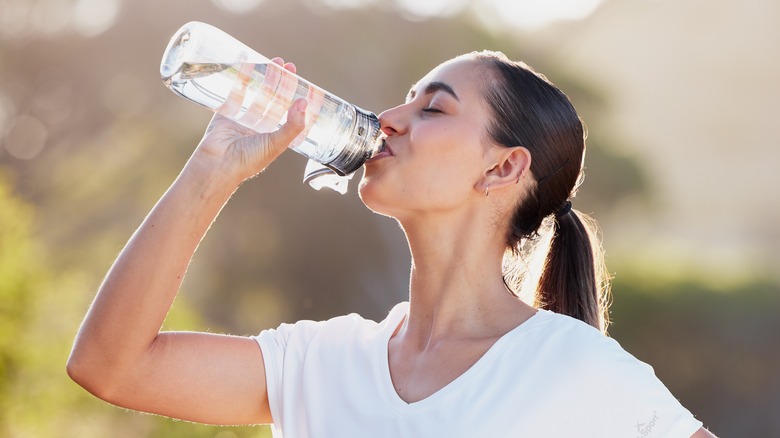Protein Mistakes You Should Avoid As You Age
You hear all the time about the importance of consuming enough protein. While it's true that it's the key to strength and can help you stay full and lose weight, it's not true that everyone has the exact same protein requirements. Your age can actually play a significant role in determining just how much you need to consume for optimal health.
Protein's role in overall health and wellbeing can't be overstated, either. It's the building block of virtually everything, including your bone mass, blood, hair, tissues, and enzymes. While the recommended daily allowance (RDA) is 0.8 grams per kilogram of body weight, many older adults fall far short of this suggestion. This lack of protein can have a significant impact on health, especially because the body does not hold onto protein. It's either consumed for energy or converted to fat, so getting the right amount to satisfy those daily needs is especially critical for older individuals.
It's crucial for aiding in healing, for example, whether you've experienced an injury and are in the recovery phase or you're getting over an illness. The bottom line, though, is that protein is such a vital source of support for the human body that it's simply essential for immunity and muscle stability, not to mention overall physical condition. With that said, here are some of the protein-related mistakes you may be making as you age.
Reducing your protein intake with age
As people age, they often consume less protein. Whether a specific choice or simply a result of a weaker appetite, a lack of protein intake can lead to muscle loss and decreased strength. It's crucial to maintain adequate intake to support muscle health (as muscle loss can occur with age) and for overall wellbeing.
In 2019, findings of a study published in the Journal of Nutrition, Health & Aging revealed that older people aren't consuming nearly enough protein. This is problematic because even if you reduce your intake, knowingly or unknowingly, when you're in your 30s and 40s, you might not notice the ramifications right away — which can spell trouble later in life, according to Nancy Rodriguez, a University of Connecticut professor of nutritional sciences. "When you combine loss of muscle with loss of bone," she says to AARP, "you've got the perfect storm to fall and fracture a hip or break an arm."
Unfortunately, the body doesn't process protein nearly as well as it grows older. Because protein is so important to functions like healing, bone mass, and muscle maintenance, it's smart to increase intake to avoid issues that may otherwise develop as a result. In addition to slower healing, less protein could also contribute to muscle atrophy and affect functions like walking and climbing stairs.
Ignoring the quality of your protein
Contrary to popular belief, not all proteins are created equal. Opting for higher-quality sources like lean meats, eggs, dairy, fish, and plant-based alternatives ensures that you get the vital amino acids you need for both muscle maintenance and repair. The protein sources that you choose to eat truly do matter, especially as you grow older.
Diversity is key, as protein can be derived from both animal and plant sources. There's no need to commit to just one type or limit yourself to only one or two foods. Explains Stephanie Cramer, a nutritionist and administrative dietitian at Cedars-Sinai Clinical Nutrition Services, "Animal proteins, such as meat, eggs, and milk, are complete proteins, meaning they provide all of the essential amino acids our body needs. Animal products provide the highest-quality protein sources."
At the same time, too much red meat could contribute to serious health issues like heart disease, type 2 diabetes, colorectal cancer, and stroke. Luckily, there are many high-quality protein alternatives that are both filling and delicious, including nuts, eggs, dairy, wild rice, and quinoa. If you're a vegetarian or vegan, your protein will likely come from some combination of these. Other options include tofu, lentils, peas, and sprouted grains.
Skipping protein at breakfast
You may have heard that breakfast sets the tone for the day — and for many people, that's definitely true. Including protein-rich foods like eggs, yogurt, waffles, or shakes can help you maintain your muscle mass and satiate your appetite to hold you over until lunchtime. Since older people often have diminished appetites, a protein-rich breakfast can make all the difference.
Unfortunately, some people tend to skip breakfast. But with age comes an even more significant need to have a morning meal. Consuming food that is high in protein at this time of the day offers many benefits, including improved muscle maintenance and ability to burn calories. Plus, breakfast proteins fill you up, so you're better satiated during the period before lunch and less likely to indulge in other foods.
"Starting the day with protein will help you have fewer cravings for sweets and carbohydrates throughout the day, and also help you build muscle mass," nutritionist Mariana Pérez Trejo Soltwedel tells Vogue. Adds fitness coach Sascha Barboza, "Our bodies spend more energy digesting and assimilating proteins than carbohydrates or fats, and the macronutrient also helps preserve lean muscle mass, which is important for maintaining an efficient metabolic rate."
Overlooking the timing of your protein intake
Although it's a good idea to eat enough protein at breakfast, it's equally important to distribute the rest of your protein intake evenly across the day. This is vital for supporting muscle protein synthesis; aiming for a balanced distribution of protein in meals and snacks from morning to night is the best way to accomplish this. This will also ensure that you're getting enough each day.
Balance is important, as studies have found that overloading protein during dinner while ignoring it during breakfast and lunch can backfire. In fact, one study in the Journal of Nutrition revealed that conditions that commonly occur with age, including osteoporosis, or weakening of the bones, and sarcopenia, or muscle atrophy, can develop as a result of significant lifestyle choices, including dietary habits.
As lead study author Doug Paddon-Jones, a muscle metabolism expert at the University of Texas Medical Branch of Galveston, explained (via Science Daily), "[W]e're not taking enough protein on board for efficient muscle building and repair during the day, and at night we're often taking in more than we can use. We run the risk of having this excess oxidized and ending up as glucose or fat." To improve synthesis, he suggests adding protein to breakfast, lunch, and dinner.
Neglecting to adjust your protein intake
Aging people may require more protein to maintain their muscle mass, largely because of reduced muscle protein synthesis. Much of the older population can benefit from a protein boost, especially those who are physically active or who may be recovering from an illness or injury. It's equally important for older individuals who have lost weight or are hospitalized to prioritize increased protein intake as advised.
According to a paper published in Contemporary Clinical Trials, a USDA survey found that one-third of older individuals don't consume their RDA of protein. The reasons are many, from chronic illnesses to a lack of appetite to dental problems. As a general lack of energy and consequently movement can also occur with age, it's worth boosting protein intake to promote essential functions associated with physical fitness. Wayne Campbell, a nutrition science professor at Purdue University, says (via KFF Health News), "While eating an adequate amount of protein is not going to prevent age-associated loss of muscle altogether, not eating enough protein can be an exacerbating factor that causes older adults to lose muscle faster."
Adding more protein isn't as hard as it may seem, either. Make it a priority to add more protein-rich options to your grocery list, like eggs, cheese, and legumes. Check the labels of foods you normally eat and see if there are higher protein alternatives available, too.
Relying solely on protein supplements
While protein powders and other similar supplements are definitely convenient, it's a mistake to consider them a replacement for a whole-food source of protein. If anything, they should complement the food instead. That's because whole foods are vital for the essential nutrients and fiber they provide, both of which are especially beneficial to older individuals.
Plus, many protein powders are geared towards endurance athletes and bodybuilders, some of which contain especially high amounts of protein that older adults may not even need. These supplements might also contain thickening agents, added sugars, milk, and other fillers that you may not want to add to your diet. Kathy McManus, a registered dietitian at the Department of Nutrition at Brigham and Women's Hospital, says (via Harvard Health Publishing), "There are limited data on the possible side effects of high protein intake from supplements." She adds that any milk in the formula could also lead to digestive upset, making it even more difficult to consume the right amount of protein per day. Aim to get your protein from whole food sources, such as eggs, nuts, Greek yogurt, chicken, turkey, and other healthy options that fill you up without unnecessary additives.
Forgetting to hydrate enough
Water is vital to the body's ability to properly metabolize protein. Without it, you could become dehydrated — and that can have a direct effect on protein synthesis and muscle function. Drinking enough water is essential when you eat protein. This is a rule of thumb that generally applies to bodybuilders and athletes, who may consume a greater amount of protein for muscle building.
However, anyone who increases their protein intake should balance that with more water. Explains Dan DeFigio, a nutrition expert, to Muscle and Fitness, "Your body has to use more water to flush out the additional nitrogen from excessive protein intake. If you don't drink enough water with a high-protein diet, you can become dehydrated."
Increasing your water intake is the easiest way to accomplish this, ensuring that you're drinking to the point that you don't feel thirsty at any point during the day. It's equally important to avoid foods and beverages that could contribute to dehydration, like excess salt and caffeine.
Falling prey to fad diet ideas
Extreme dieting isn't recommended for any age group, but one that restricts protein and potentially causes muscle loss (along with other health issues) can be especially harmful to older people. In general, opting for a more balanced diet that includes adequate protein is essential to better overall health.
Some fad diets are especially harmful because they restrict specific kinds of foods that may otherwise give you the protein that you need. Doctors may advise people with kidney and liver health issues to consume low-protein diets, but otherwise eating foods that are strictly on the lower-protein end of the scale could lead to significant nutritional deficiencies that affect your long-term health.
At the same time, diets that favor excess protein, like Atkins (a low-carb plan that allows for unlimited fat and protein) and South Beach (a low-carb and low-fat plan that calls for increased protein), could be harmful to some older individuals if their bodies simply don't require that much protein. This is why it's important to get an annual physical and get regular bloodwork. These labs can reveal liver and kidney values that play a more important role in determining how much protein you should eat — and which fad diets you should avoid.
Neglecting to make exercise a priority
What's the link between exercise and protein? It's a big part of maintaining muscle mass and strength, which is why older individuals are encouraged to make physical activity, and in particular resistance training, a regular part of their routine. By pairing exercise with adequate protein intake, a person can experience better muscle health and greater strength.
Mary Marian, RDN, explains to Consumer Reports that a lack of dietary protein causes the body to break down the muscles, leading to significant muscle decline. Moreover, over time, you may become weaker. This is why exercise is so vital. It supports muscle tone and mass and improves your overall strength.
Eating enough protein to balance your workouts also ensures that you're strong enough to meet those physical demands. It can also help you manage your weight, promote cardiovascular health, and even potentially prevent the development of certain chronic diseases that may otherwise afflict older individuals.
Not making diverse proteins a part of the plan
Not only is eating the same thing all the time boring, but it doesn't provide the body with the essential nutrients it needs to thrive. Mixing up common protein choices (like lean meats and eggs) with plant-based options (like beans, nuts, lentils, and seeds) is a great way to shake things up.
The Harvard T.H. Chan School of Public Health dubs this the "protein package," as you'll not only consume the right amounts of muscle-boosting macronutrients but also get the beneficial omega-3 fats and fibers that promote things like cardiovascular and digestive health. Just as importantly, not all protein-rich foods are exactly healthy. Broiled sirloin steak, for example, is loaded with both protein and saturated fat. Many meats also contain excessive amounts of sodium.
Eating a more balanced protein plan means you'll get a little bit of everything with your meals. Legumes, for example, provide both protein and fiber. Salmon is a low-sodium option with barely any saturated fat and an excellent source of omega-3 fatty acids. When you mix up your protein sources and glean them from whole foods, you can be confident you're eating the right balance to support a healthy, well-rounded diet.
Not discussing protein needs with the doctor
No two people are alike. One's needs can differ dramatically from another, especially where protein is involved. Those requirements can vary based on factors like age, health status, and activity level, which is why you shouldn't neglect to involve your healthcare provider in determining how much protein you need.
If you're older and in good health, your doctor may recommend that you increase your protein intake to protect you from issues in the future. Says dietitian Katie Dodd, MS, RDN, to Today's Dietitian, "If older adults don't get enough protein, they're at an increased risk of muscle loss and malnutrition. Muscle is needed to maintain independence. Losing muscle can increase risk of falls, hospitalization, disability, and early death."
Older individuals who are unwell or recovering from procedures might need more protein, along with those who exercise regularly. By contrast, those with preexisting health issues or chronic diseases may have more limited protein requirements. It's crucial to identify those needs before making any significant changes to your diet, as this could have longer-term effects. Once your doctor provides you with that guidance, you can then adjust your protein intake to meet your personal needs.
Not eating proteins that are easy to digest
It may become more difficult for some people to digest food as they age. This inefficiency is not unusual, but eating the right foods can help tame the discomfort. Opt for easily digestible sources of protein, such as fish, tofu, and poultry — and know what your limitations are, too.
Lori Walker, a registered dietitian, tells Men's Health, "Protein is an important part of your diet, providing essential nutrients for muscle growth and development. Unfortunately, it can also cause digestive problems in some people, such as bloating, flatulence, and stomach pain." If you're prone to these issues and develop them after eating protein, you may feel compelled to reduce your intake as a result.
Luckily, there are many stomach-friendly options in both meat-based and plant-based categories. Flaky fish is light and generally easy on the stomach, as is baked chicken. Eggs are commonly considered gentle, along with nut butters. Take your time experimenting with different types of protein sources, and stick with those that don't cause distress.












